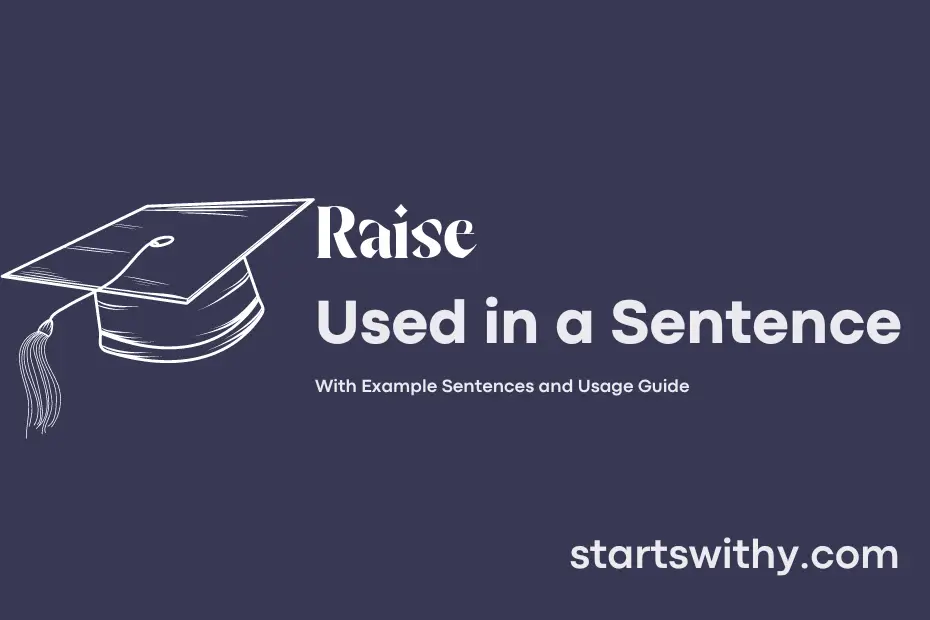Are you looking to enhance your writing skills by mastering the art of crafting strong sentences? One crucial element to achieve this is understanding how to effectively use keywords like “raise” in your writing.
To raise means to lift or elevate something to a higher position, both literally and figuratively. In writing, this word can be used to convey increasing something in quantity, quality, or intensity. Understanding how to properly utilize “raise” in your sentences can significantly improve the impact and clarity of your writing.
7 Examples Of Raise Used In a Sentence For Kids
- Please raise your hand if you want to speak.
- Let’s all raise our voices and sing together.
- Can you raise your head and look up at the stars?
- Don’t forget to raise your pencil in the air if you know the answer.
- We will raise the flag for our country during the morning assembly.
- It’s important to raise your eyes and carefully read the question.
- Don’t be shy, feel free to raise your hand and ask a question.
14 Sentences with Raise Examples
- Raise your hand if you have any questions about the assignment.
- Remember to raise your concerns with the professor during office hours.
- It is important to raise awareness about mental health issues on campus.
- Don’t forget to raise your voice during the student council elections.
- Let’s work together to raise funds for the upcoming college festival.
- The student union is planning to raise the issue of hostel fees during the meeting.
- We should raise the standards of cleanliness in the college cafeteria.
- The college encourages students to raise their academic performance each semester.
- It’s essential to raise your grades in order to qualify for internships.
- The debate club aims to raise important social issues in their discussions.
- The college is planning to raise the minimum attendance requirement for students.
- Students should raise objections if they feel their rights are being violated.
- The college is looking to raise the quality of extracurricular activities offered to students.
- Let’s raise a toast to celebrate the successful completion of our exams.
How To Use Raise in Sentences?
Raise means to lift something to a higher position or increase the amount or level of something. When using this word in a sentence, it’s important to pay attention to the context in which it is being used.
Here are some tips on how to use raise in a sentence:
-
Raise can be used when talking about physically lifting something. For example, “She raised her hand to ask a question.”
-
Raise can also refer to increasing the level or amount of something. For instance, “The company decided to raise prices on their products.”
-
When talking about parents or caregivers, raise is often used to talk about bringing up or caring for children. For example, “They raised their children to be respectful and kind.”
-
It’s important to remember that raise is a regular verb, so its past tense form is “raised” and the present participle is “raising.”
By keeping these tips in mind, you can effectively use raise in your sentences. Practice using it in different contexts to become more comfortable with incorporating it into your everyday speech and writing.
Conclusion
In conclusion, the examples of sentences with “raise” demonstrate its versatility in expressing different meanings within varied contexts. Whether used in the context of increasing something physically, such as “The construction company will raise the height of the building,” or in the sense of enhancing emotions or awareness, like in the phrase “The inspirational speaker’s words raise our spirits,” the word “raise” can be applied creatively in diverse ways. Its adaptability highlights its significance in conveying both tangible and abstract concepts effectively.
By exploring the numerous ways in which “raise” can be incorporated into sentences, it becomes evident that this word is a valuable tool for communication. Whether signaling growth, improvement, or elevation, the use of “raise” adds depth and clarity to the message being conveyed, making it a key component of expressive writing and speech.



